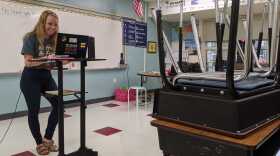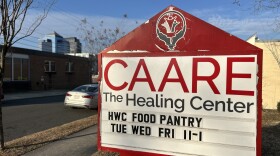With no students in the building due to the coronavirus pandemic, notes sent home by a teacher in a student's backpack are no longer an option. Emails and automated voice messages can get lost in the chaos. So to reach families with vital information, staff and volunteers at Lakewood Elementary in Durham are picking up their phones.
"Hola, buenas tardes. Cómo está?" Julie Mendoza Grubbs greets a mother of a Lakewood Elementary student via her cell phone.
Mendoza Grubbs is a volunteer at the school. Every week, she calls about a dozen families. When she saw a call out for bilingual volunteers in her neighborhood, she says the decision to help was simple.
"This is the thing I can do. I speak Spanish, there's this need for people to receive this information in Spanish," Grubbs said, adding that she was inspired by a quote from Fred Rogers to be a helper in times of distress.
Lakewood Elementary serves mostly Black and brown students. A little more than half come from Spanish-speaking homes.
Many schools are struggling to communicate virtually with students' families during the pandemic. These families need updated information, and might also need tech help, hot spots or a hot meal. Given those needs, Lakewood Elementary organized a way to reach their school community in both English and Spanish.
When the pandemic shuttered schools in March, staff there came up with a plan to check on their students, by phone, text or WhatsApp — whatever means necessary to reach parents.

Mayra Morales-Scott teaches English as a Second Language at the school.
"My biggest concern at that point, whenever I first started contacting parents was more so just getting to know where they were emotionally," Morales-Scott said. "One of my first questions to them is just, 'How are you doing?'"
She says the school didn't want to impose on families, they wanted to build relationships.
"I want to say more than half of the parents that I spoke to [in March] had financial concerns," Morales-Scott said.
So the school started fundraising, calling on local organizations and family and friends to donate to help Lakewood families. They raised more than $40,000 last spring, which allowed them to provide direct cash assistance of about $500 to each family at the school that needed financial help due to the pandemic.
"We wish we could have done more," Morales-Scott said.
Staying In Constant Contact
That was just the start. Since the school's staff had proven they could reach almost every family, they knew they could do it again and again.
Morales-Scott said she's been in almost constant contact with families, and they're full of questions.
"It defeats the stereotype that just some of our parents don't care. They do care. It's just it's hard for them to get in contact with teachers, especially when there's a language barrier there," Morales-Scott said.
She empathizes, because when she was growing up, she was an ESL student through much of her elementary school days.
"Every single time I encounter a parent who cannot communicate with their classroom teacher, or their administrators, it just takes me back to how my mom must have felt when she wanted to relay something, and she just couldn't," Morales-Scott said.
Building a Community School, From the Ground Up
Even as the pandemic wears on, Lakewood Elementary has kept up with calling all families at least once a week.
"For a lot of our families, their child's school, and particularly their neighborhood public school is the most reliable public institution that they're connected with," explained Anna Grant, Lakewood Elementary's Community Schools Coordinator.

"We take our responsibility really seriously, especially during this time to make sure that our families, even if we can't resolve all of their problems, have someone who they can talk to, who might be able to connect them with resources," Grant said.
Lakewood Elementary employs the community schools model. It's not a program, so much as a way of doing things. The model is promoted by the National Education Association, a national teachers' organization and lobbyist. Durham Public Schools funds community schools coordinators at two of its elementary schools, as part of a pilot project with financial support from the Durham County Board of Commissioners.
Grant's job as Lakewood's Community Schools Coordinator is to form relationships with community partners -- like the organizations that supported their fundraiser and the volunteers who help call parents. Another part of her job is to build strong communication with families, and to cultivate leadership and teamwork among the school's teachers and staff to provide students with wraparound services.
Grant says that although what Lakewood Elementary has managed to do during the pandemic is rare, "it's not magic, it's organizing."
"It's really about bottom up, community-driven problem solving and change," Grant said.
What A Community School Means For Families
Families say they appreciate the consistent support Lakewood Elementary gives them. Deysi Vidal is the mother of a Lakewood Elementary fourth grader.
"Realmente, Lakewood nos ha tratado como un miembro de la familia," Vidal said.
She said Lakewood treats them like a member of the family, and her son feels comfortable there.
"Ha sido un bendición. Ellos nos han dado toda en al apoyo que necesitamos," Vidal said.
Vidal says the school has been a blessing. Her son's teacher calls her almost every day. When their whole family was sick with COVID-19 over the summer, her son's teacher brought food to their house while they recovered.
Stories of teachers going above and beyond during the pandemic are plenty, but this school has made a culture out of it.










